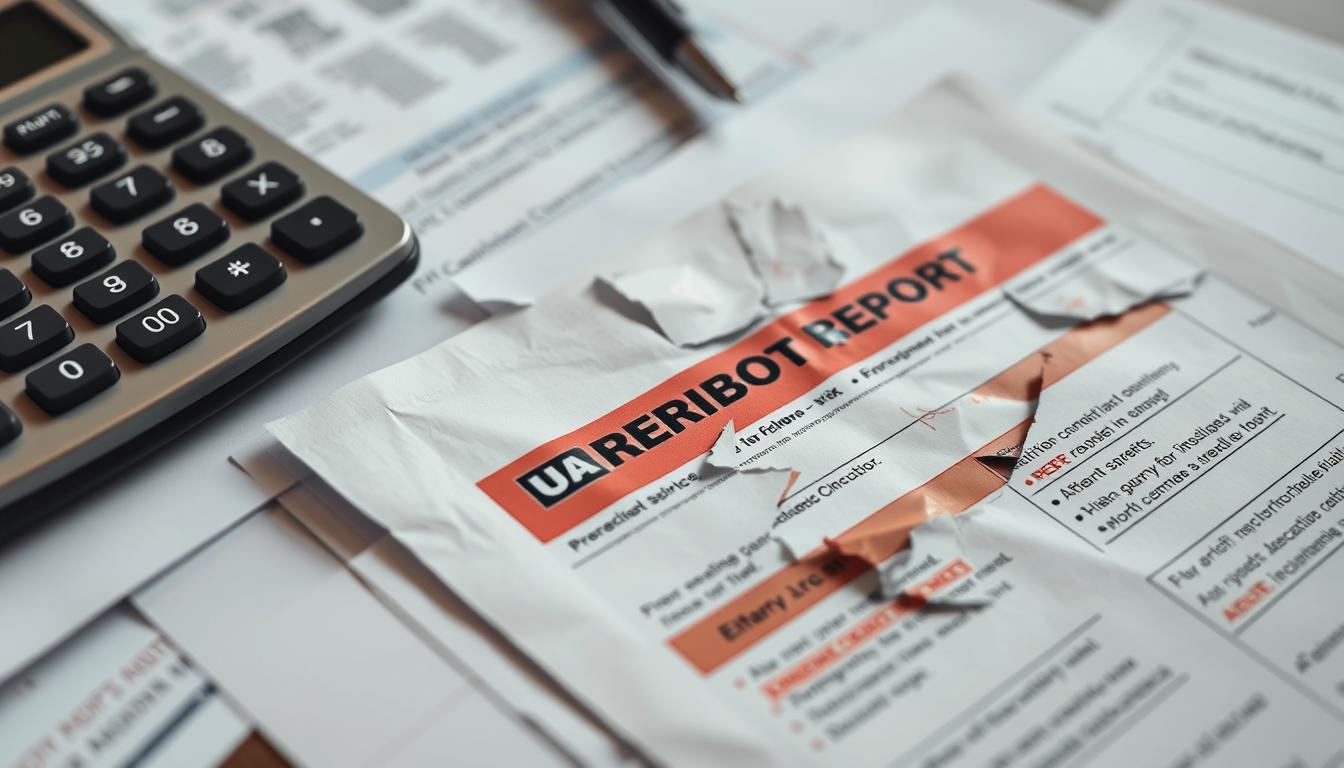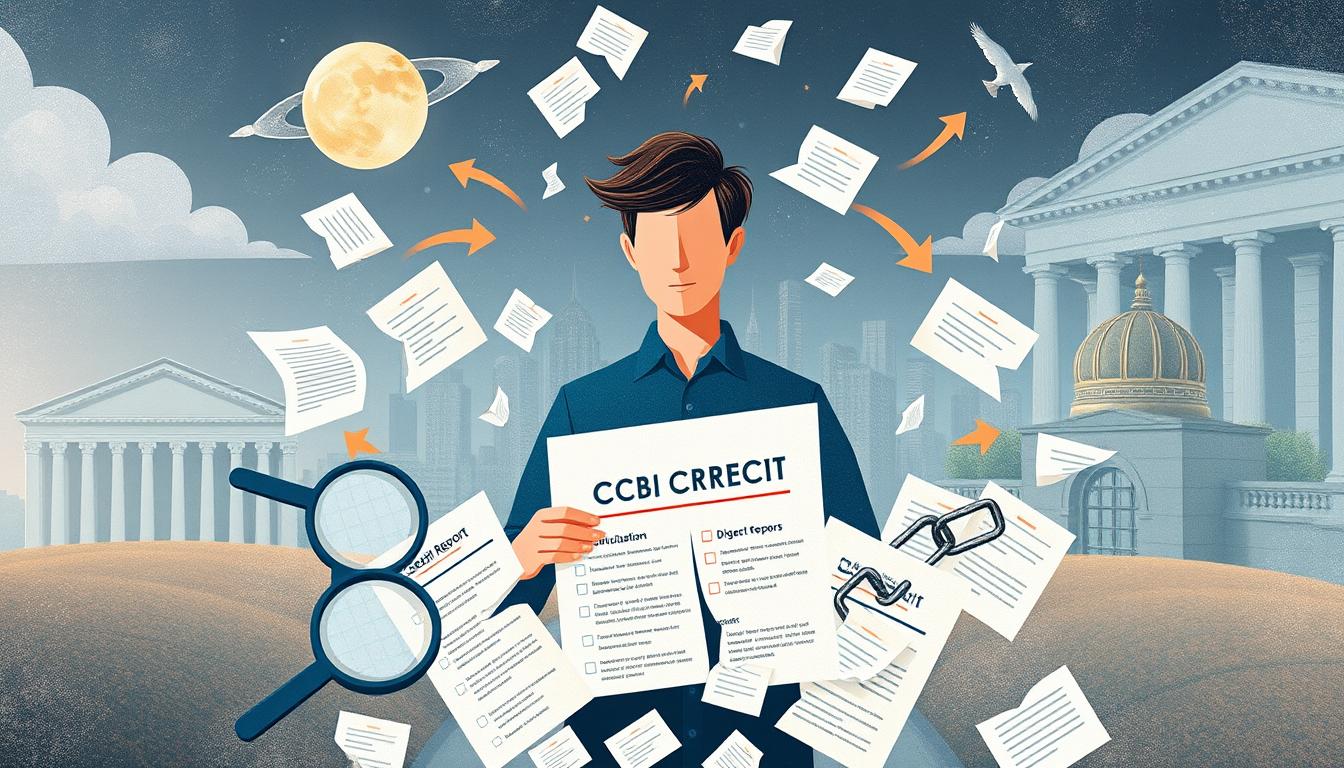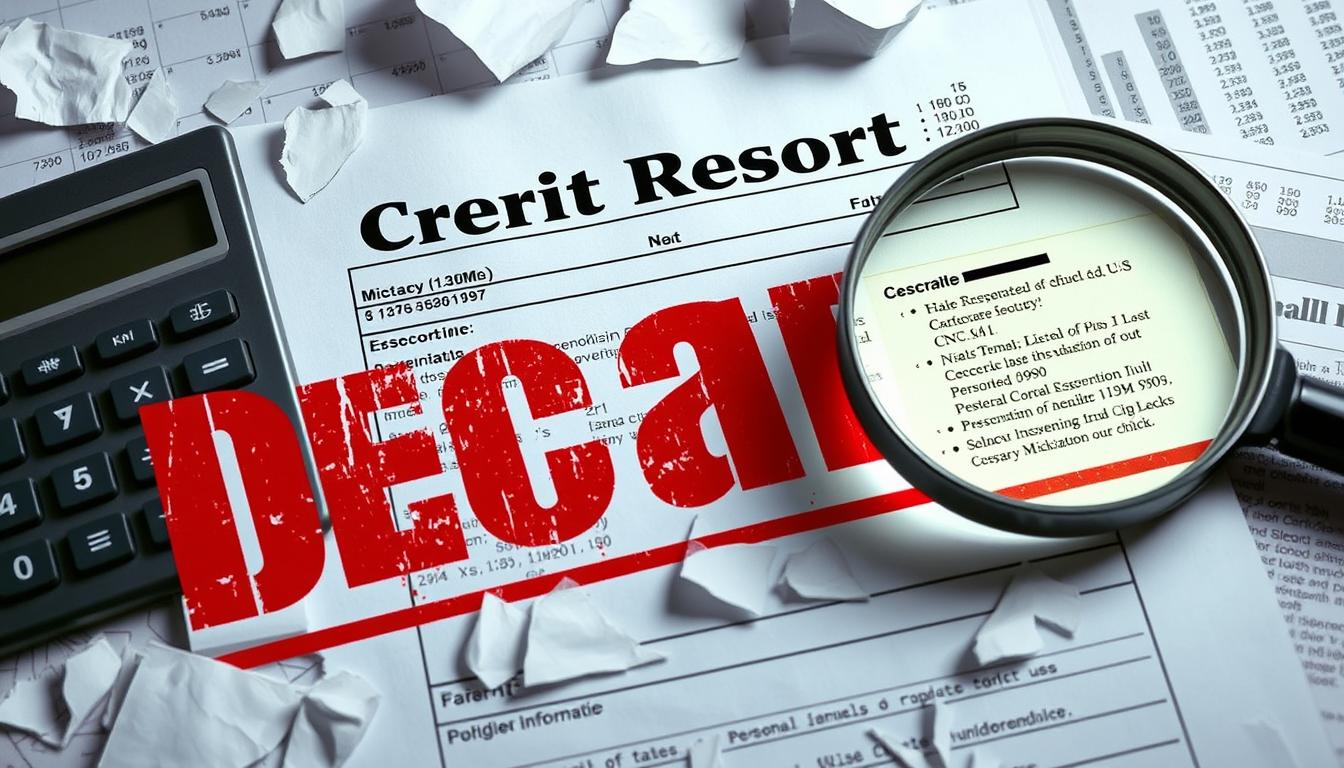A healthy credit report is vital for many aspects of life. It affects loan terms, credit card approvals, and even job prospects. Double reporting is a common issue on credit reports. This happens when the same account appears multiple times, leading to inaccurate data.
Duplicate entries can harm your credit score. They create a false picture of your financial situation. It’s crucial to spot and fix these errors promptly.
Key Takeaways
- Understand the concept of double reporting and its causes
- Explore the impact of duplicate entries on your credit score
- Learn how to identify and scrutinize potential double reporting on your credit report
- Discover your rights under the Fair Credit Reporting Act
- Gain a step-by-step guide to correcting duplicate entries
- Communicate effectively with creditors and debt collectors to resolve issues
- Develop strategies to prevent future double reporting problems
Understanding Double Reporting on Credit Reports
Credit reports can be complex and confusing. Double reporting is a common issue that can affect your creditworthiness. It happens when the same account appears multiple times on your credit report.
What is Double Reporting?
Double reporting occurs when a single account is listed more than once on your credit report. This can happen due to credit report errors, duplicate entries, or inaccurate credit data.
Causes of Duplicate Entries
Duplicate entries can happen for various reasons. Let’s explore some common causes.
- Clerical errors by creditors or credit bureaus when inputting account information
- Failure to properly update or close accounts when transferring debt between creditors
- Incorrect reporting of the same account as both an original debt and a collection item
- Errors in merging or splitting credit files due to similar personal information
Knowing why double reporting happens is key to fixing these issues. It’s important to address these problems on your credit report.
“Duplicate entries on credit reports can have a significant impact on an individual’s credit score and overall financial well-being.”
Impact of Double Reporting on Your Credit Score
Your credit score is vital for financial health. Double reporting on credit reports can harm this important number. It can inflate debt or account numbers, leading to a lower score and financial issues.
Double reporting can make your score drop significantly. This can hinder your ability to get loans, credit cards, housing, or jobs. Lenders use credit scores to judge creditworthiness.
Any errors in your report can raise red flags. It’s crucial to address these issues promptly.
| Scenario | Impact on Credit Score |
|---|---|
| Single Debt Reported Twice | Up to 100-point decrease |
| Multiple Duplicate Accounts | Up to 150-point decrease |
This table shows how double reporting affects credit scores. A single duplicated debt can drop your score by 100 points. Multiple duplicate accounts can cause a 150-point decrease.
A good credit score is key for better interest rates and financial stability. Fixing double reporting issues helps ensure your score reflects true creditworthiness.
Take charge of your financial future by addressing these credit report errors. Your efforts can lead to a more accurate credit score.

Identifying Duplicate Entries on Your Credit Report
Checking your credit report is vital for finding credit report errors, including duplicate entries. A careful review can reveal inaccurate credit data that may hurt your credit score.
Scrutinizing Credit Report Entries
Examine each account on your credit report closely. Look for accounts that seem to be duplicates. Check details like creditor name, account number, and balance.
Pay attention to the dates for each entry. This can help you spot if an account is reported multiple times.
Common Indicators of Double Reporting
Here are signs that may point to duplicate entries on your credit report:
- Identical account information, such as creditor name, account number, and balance
- Varying dates or reporting periods for the same account
- Multiple entries for the same debt, such as a primary account and a collection account
- Accounts with similar names or spellings, potentially indicating a mix-up or clerical error
Stay alert and examine your credit report carefully. This helps you spot duplicate entries or other credit report errors affecting your credit profile.
Checking your report is key to keeping your credit information accurate. It also protects your financial health.
The Fair Credit Reporting Act and Your Rights
The Fair Credit Reporting Act (FCRA) protects consumers’ rights regarding their credit reports. It allows people to dispute wrong or incomplete information with credit bureaus. This includes cases of double reporting.
The FCRA lets you get free yearly credit reports from Equifax, Experian, and TransUnion. You can check these reports for mistakes that might hurt your credit score.
If you find an error, you can file a dispute with the credit bureau. They must look into the issue and fix any proven mistakes quickly.
- The FCRA requires credit bureaus to investigate disputes within 30 days.
- Consumers have the right to submit supporting documentation to substantiate their dispute.
- If an error is found, the credit bureau must correct it and provide the consumer with a free copy of their updated credit report.
Knowing your FCRA rights helps you keep your credit reports accurate. You can address issues like double reporting and protect your credit score.
| Key Rights Under the FCRA | Description |
|---|---|
| Free Annual Credit Reports | Consumers can obtain a free copy of their credit report from each of the three major credit bureaus once per year. |
| Dispute Inaccuracies | Consumers have the right to dispute any inaccurate or incomplete information on their credit reports with the credit bureaus. |
| Timely Investigations | Credit bureaus must investigate disputes and correct verified errors within 30 days. |
| Free Updated Reports | If an error is corrected, the consumer must be provided with a free copy of their updated credit report. |
Use your FCRA rights to keep your credit reports accurate. This helps you tackle issues like double reporting and maintain a good credit score.
Correcting Duplicate Entries: Step-by-Step Guide
Fixing duplicate entries on your credit report is vital for a healthy credit profile. Follow these steps to correct errors and protect your creditworthiness. Let’s explore how to get your credit report back on track.
Gathering Supporting Documents
Start by collecting all relevant documents as evidence. This includes credit reports from Experian, Equifax, and TransUnion. Gather statements from creditors showing accurate account information. Include any correspondence related to the duplicate entries.
Drafting a Dispute Letter
Now, draft a dispute letter to the credit bureaus. Clearly identify the duplicate entries and explain why they’re inaccurate. Include your full name, address, and contact information.
List the specific duplicate entries you’re disputing, with account numbers and creditor names. Explain why they’re duplicates and provide the correct information for your credit report.
Attach copies of supporting documents as evidence. Request that the credit bureau investigate and fix the inaccuracies. Keep copies of everything for your records.
| Key Steps for Correcting Duplicate Entries | Description |
|---|---|
| 1. Gather Supporting Documents | Collect credit reports, statements, and any relevant correspondence related to the duplicate entries. |
| 2. Draft a Dispute Letter | Clearly identify the duplicate entries, explain the inaccuracies, and request the credit bureau to investigate and correct the errors. |
| 3. Submit the Dispute | Send the dispute letter and supporting documents to the credit bureau via certified mail or through their online dispute portal. |
| 4. Follow Up and Monitor | Track the status of your dispute and ensure the credit bureau resolves the duplicate entries in a timely manner. |
This approach helps you effectively disputing errors and credit repair your credit report. You’ll restore accuracy and protect your financial well-being. Stay proactive in maintaining a clean credit report for better financial opportunities.
Maintaining a clean and accurate credit report is essential for securing favorable financing terms and achieving your financial goals.
Disputing Errors with Credit Bureaus
Fixing credit report errors is vital for your financial health. It may seem tough, but it’s crucial to keep your credit info accurate. Take action when you spot duplicate entries or other issues.
The Fair Credit Reporting Act (FCRA) sets rules for credit bureaus. They must investigate disputes within 30-45 days. During this time, they check with creditors to verify info and make corrections.
- Gather all relevant documentation: Collect any paperwork, receipts, or records that support your claim of a reporting error.
- Submit a written dispute: Draft a clear, concise letter outlining the specific errors you’ve identified and the actions you’d like the bureau to take.
- Follow up and monitor the progress: Keep track of the dispute’s status and be prepared to provide additional information if requested by the credit bureau.
Know your rights and take action to dispute errors. This helps keep your credit bureaus report accurate. It also protects your financial future.
By tackling disputing errors, you’re safeguarding your credit history. This step is key to maintaining your financial well-being.
“Accuracy is the foundation of credit reporting, and disputing errors is a crucial step in maintaining the integrity of your credit history.”

| Credit Bureau | Dispute Resolution Timeframe | Contact Information |
|---|---|---|
| Experian | 30 days | https://www.experian.com/disputes/main.html |
| Equifax | 30 days | https://www.equifax.com/personal/credit-report-services/credit-dispute/ |
| TransUnion | 45 days | https://dispute.transunion.com/dp/dispute/landingpage.jsp |
Dealing with Creditors and Debt Collectors
Effective communication with creditors and debt collectors is key to fixing credit report errors. These parties help ensure your credit report is accurate. They play a crucial role in updating and correcting information.
Communicating with Creditors
Contacting creditors directly is essential for resolving credit report errors. Gather all relevant documents, like billing statements and payment records. These will help you explain the issue clearly.
Be polite and professional when talking to creditors. Explain the error, such as duplicate entries or wrong data. Provide evidence to support your claim.
Ask the creditor to investigate and fix the error on your credit report. If they refuse, contact customer service or file a dispute with credit bureaus.
| Effective Communication Strategies with Creditors | Avoid |
|---|---|
|
|
These strategies can help you resolve credit report errors effectively. Work with creditors to fix duplicate entries or wrong data. Your persistence will ensure your credit report stays accurate.
double reporting on credit report
Double reporting on credit reports can significantly impact your credit score. It happens when the same credit info appears multiple times. This creates duplicate entries on your credit report.
Spotting and fixing double reporting is vital for accurate credit information. Let’s explore this issue and find ways to solve it.
Understanding the Causes of Duplicate Entries
Duplicate entries can happen for various reasons. Creditors might report the same account to multiple credit bureaus. Errors in reporting can cause an account to appear more than once.
Sometimes, a credit account transfer or sale leads to duplicate reporting. These duplicates can muddle your credit profile and potentially harm your credit score.
Identifying Duplicate Entries on Your Credit Report
Carefully review your credit report to spot double reporting. Look for repeated account info like numbers, balances, and payment histories. Be aware that duplicate entries may have slight differences.
Signs of double reporting include identical account details and similar account or creditor names. You might also see duplicate hard inquiries or collections items.
By finding these duplicates early, you can take steps to fix them and keep your credit info accurate.
Correcting Double Reporting
Once you’ve found double reporting, take action to fix it. Dispute the duplicate entries with credit bureaus. Provide proof to show the inaccuracy.
Follow a clear dispute process and talk to creditors. This helps resolve double reporting and ensures your credit report is accurate.

Fixing double reporting is crucial for a healthy credit profile. Stay alert and take action to protect your credit. This paves the way for a stronger financial future.
Preventing Future Double Reporting Issues
Regular credit report checks are vital to avoid errors like duplicate entries. Actively managing your credit information helps catch problems early. This approach prevents issues from affecting your credit score.
Monitoring Your Credit Reports
Make credit report reviews part of your financial routine. Check reports from Experian, Equifax, and TransUnion yearly. Increase frequency if you suspect credit report errors or duplicate entries.
Timely reviews help identify and address issues quickly. This includes any credit repair needs that may arise.
- Examine each account and transaction listed on your credit reports to ensure accuracy.
- Look for any suspicious or unfamiliar activity, such as accounts you don’t recognize or multiple entries for the same debt.
- Verify that the personal information, payment history, and credit limit details are correct for each account.
Regular monitoring helps maintain good credit health. It allows you to spot credit report errors or duplicate entries early. This prevents negative impacts on your credit repair efforts.
Proactive credit management protects against double reporting and other credit issues. Stay alert and take charge of your finances. Regularly review your credit reports and address any problems promptly.
Working with Credit Repair Services
Credit repair services help people fix credit report errors. These experts know how to handle double reporting issues. They can improve your credit standing by addressing inaccuracies.
These services excel at finding duplicate entries on credit reports. They understand the Fair Credit Reporting Act (FCRA) well. They can dispute errors with credit bureaus for you.
Credit repair services save you time and effort. They gather documents, write dispute letters, and follow up. This frees you from tedious tasks.
These experts guide you through credit repair steps. They teach you about your FCRA rights. This knowledge helps you maintain an accurate credit profile.
Credit repair services have pros and cons. They charge fees, so research providers carefully. Some may make unrealistic promises or use shady tactics.
Consider your situation before hiring a credit repair service. Weigh the benefits and limitations. Decide if professional help suits your credit repair needs.

| Benefits of Working with a Credit Repair Service | Considerations when Choosing a Credit Repair Service |
|---|---|
|
|
Credit Score Recovery After Resolving Duplicate Entries
Fixing double reporting issues on your credit report can boost your credit score. By removing these errors, you’re rebuilding your credit profile and regaining lender trust. This step is crucial for your financial future.
As credit bureaus update your report, your credit score will slowly improve. This process takes time, but the benefits are worth it. A clean credit history is key for better loan terms and job opportunities.
The recovery timeline varies for each person. Many see their credit scores rise within a few months of fixing duplicate entries. Keep checking your credit reports to catch and fix any new issues quickly.

